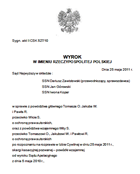 There are many interesting ways one may become a co-author of a copyright work, but in one of its recent decisions the Polish Supreme Court seems to have added a new and quite interesting option. You can namely become a co-author if you delete a few sentences from a scientific article, sentences you believe are factually incorrect.
There are many interesting ways one may become a co-author of a copyright work, but in one of its recent decisions the Polish Supreme Court seems to have added a new and quite interesting option. You can namely become a co-author if you delete a few sentences from a scientific article, sentences you believe are factually incorrect.
The court’s decision was made based on the following facts: The defendant wrote an article about music therapy, i.e. applying music in medical treatment. Not being a physician herself, the author had requested three colleagues to verify the article and, as a result, they suggested deleting some parts, which, in their view, were not compatible with accepted medical knowledge (they were probably right, as one of the deleted sentences considered replacing anesthesia by music during surgery, which even to devoted music lovers must sound rather extreme). The defendant initially agreed to publish the article together with her – then – colleagues as co-authors, but later changed her mind. The colleagues duly sued to have their co-authorship recognised and, in the eyes of many experts surprisingly, won in all instances, including the Supreme Court.
The judgment is easy to criticise, because the court seems to have forgotten some basic precepts of copyright protection, and especially that copyright does not protect the actual “knowledge” contained in a publication. It also provokes the question whether all reviewers in scientific journals or university professors tutoring students, who certainly quite often (rightly or wrongly) consider certain parts of the reviewed works inaccurate or incorrect and have them deleted should not be regarded co-authors (if so, this would probably have to be the case with all university professors guiding their students through a thesis!).
But the problem goes further, since it is undeniably true that authorship in copyright is ill-fitted for a large number of scientific publications. What counts in fields such as biology, chemistry, physics and other natural sciences is who made the discovery, formulated a theory, etc, and not who described it in a publication as nobody reads such publications for the purity of form and elegance of style. To recognise as the author the person who has not contributed much to the described experiment and to deny authorship to those who made the largest contribution is against common sense. To recognise the real contribution may be against the principles of copyright law.
When the Polish Supreme Court observed that co-authorship existed if “in consequence of the changes introduced by the plaintiffs, a work of a different character was created which without the plaintiffs’ contribution would have taken a different shape.” it might have been onto something, at least as far as scientific works are concerned, but in this very case the decision is in my opinion rather obviously wrong, and should not be followed.
Polish Supreme Court, June 22, 2010, II CSK 527/10
_____________________________
To make sure you do not miss out on regular updates from the Kluwer Copyright Blog, please subscribe here.
Kluwer IP Law
The 2022 Future Ready Lawyer survey showed that 79% of lawyers think that the importance of legal technology will increase for next year. With Kluwer IP Law you can navigate the increasingly global practice of IP law with specialized, local and cross-border information and tools from every preferred location. Are you, as an IP professional, ready for the future?
Learn how Kluwer IP Law can support you.


